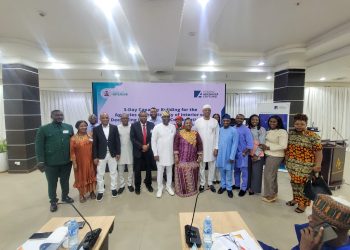By Nkechi Eze
The Director General and Chief Executive Officer of the Nigerian Meteorological Agency (NiMet), Professor Charles Anosike, has called for greater compliance with weather-related guidelines in ferry operations across Nigeria, stressing that accurate and timely weather forecasting is key to the safety and resilience of maritime transportation systems.
Delivering a keynote address at the 2025 Regional Ferry Safety Conference, held from June 25–26 at the Continental Hotel, Lagos, Professor Anosike highlighted the increasing vulnerability of ferry operations to adverse weather conditions, especially in light of changing climate patterns and the growing importance of inland and coastal ferry services to Nigeria’s transport infrastructure.
He underscored the urgent need for ferry operators, port authorities, and maritime regulators to embed weather alert systems into their operational frameworks. According to the NiMet DG, “Maritime regulation must ensure that ferries and ports adopt more sustainable practices, including the integration of weather early warning alerts into ferry operations. Timely and accurate early warning is indispensable and serves as a guide toward strategic operational planning.”
Professor Anosike noted that early warning systems empower ferry operators to more effectively plan their routes, deploy crews, and conduct pre-departure assessments. These actions, he said, are crucial in reducing weather-related delays, minimizing the risk to passengers and crew, and enhancing search-and-rescue preparedness.
“Real-time updates enable ferry operators to conduct thorough pre-departure assessments and make climate-informed decisions on the safety and viability of each trip,” he added, stressing that meteorological data must move beyond mere availability to being actively integrated into safety-critical decision-making.
In highlighting the collaborative approach required to make meteorological services more impactful, the NiMet boss stated: “Realizing that meteorological services are better provided in collaboration with the users, NiMet, in year 2022, hosted a needs assessment workshop for stakeholders, including the Nigerian Maritime Administration and Safety Agency (NIMASA), the Nigerian Ports Authority (NPA), the Nigerian Inland Waterways Authority (NIWA), the Nigerian Navy, Marine Police, Fishing Communities, Ferry Operators, etc.”
That engagement, according to him, led to the signing of Memoranda of Understanding with key maritime stakeholders such as NIMASA, NIWA, and the Maritime Organization of West and Central Africa (MOWCA), designed to strengthen cross-agency capacity and data sharing in the maritime domain.
“The objective of the collaborative activities between NiMet and the relevant agencies in the maritime industry is to enhance the capacity of the parties with a view to the provision of relevant meteorological data and tools that will enhance the sustainable development of the marine environment,” he explained. This, he added, includes the delivery of tailored meteorological products to ships and floating infrastructure to support safe navigation, maritime security, and environmental protection.
Professor Anosike also outlined a five-point strategy to overcome challenges in optimally using meteorological data for ferry operations. While the specific points were not detailed in the address, he maintained that their implementation would go a long way in reducing incidents and improving the efficiency of maritime transport.
He concluded by affirming NiMet’s readiness to continue delivering impact-based marine forecasts and specialized meteorological services designed specifically to support the ferry sector. “Weather forecasts for safe navigation are fundamental to the economic prosperity of Nigeria’s coastal dwellers,” he said. “By proactively addressing our existing challenges and diligently implementing these recommendations, we can make significant progress, enhance the well-being and efficiency of ferry operations, and move closer to achieving sustainable economic development in Nigeria.”
The two-day Regional Ferry Safety Conference brought together key stakeholders from government agencies, maritime regulators, ferry operators, and safety advocates to deliberate on strategies for enhancing ferry transport safety and building resilience against climate-induced disruptions.

















